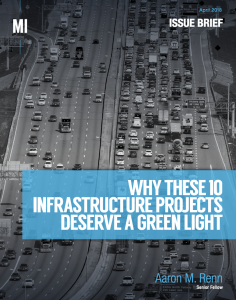
I have argued that the primary infrastructure need in the US is for maintenance, not new builds or expansion. But clearly building nothing new isn’t realistic, so what projects should we build and why?
I just released a new Manhattan Institute issue brief highlighting some criteria for when new infrastructure can be justified, along with a list of 10 specific projects that make sense. I include transit, freight rail, highways, airports, and energy on the list.
My criteria:
• where the existing infrastructure is at or over capacity and is experiencing a significant historical (not just projected) growth in demand, in a region that is growing overall; (this last bit is to rule out sprawl subsidizing roads in regions that are stagnant);
• where infrastructure is obsolete or nearing the end of its useful life; where the original networks did not envision the current distribution of demand, such as highway links between cities that used to be very small but now are very large; and
• where the project costs can be recovered from user fees such as tolls
And my project list:
Passenger Rail
1. Gateway Project (New York City and New Jersey)
2. North–South Rail Link (Boston)
Freight Rail
3. Chicago Region Environmental and Transportation Efficiency (CREATE) program (includes passenger rail benefits)
Highways
4. I-11 link between Phoenix and Las Vegas
5. I-35 Capitol Express project (Austin)
6. SR 37 freeway improvement (Indianapolis)
7. I-345 freeway removal (Dallas)
Airports
8. Kansas City International Airport terminal improvement
9. Denver International Airport expansion
Energy
10. New England gas pipeline
Click through to read the whole thing.
This piece originally appeared on Urbanophile.
Aaron M. Renn is a senior fellow at the Manhattan Institute, a contributing editor of City Journal, and an economic development columnist for Governing magazine. He focuses on ways to help America’s cities thrive in an ever more complex, competitive, globalized, and diverse twenty-first century. During Renn’s 15-year career in management and technology consulting, he was a partner at Accenture and held several technology strategy roles and directed multimillion-dollar global technology implementations. He has contributed to The Guardian, Forbes.com, and numerous other publications. Renn holds a B.S. from Indiana University, where he coauthored an early social-networking platform in 1991.












